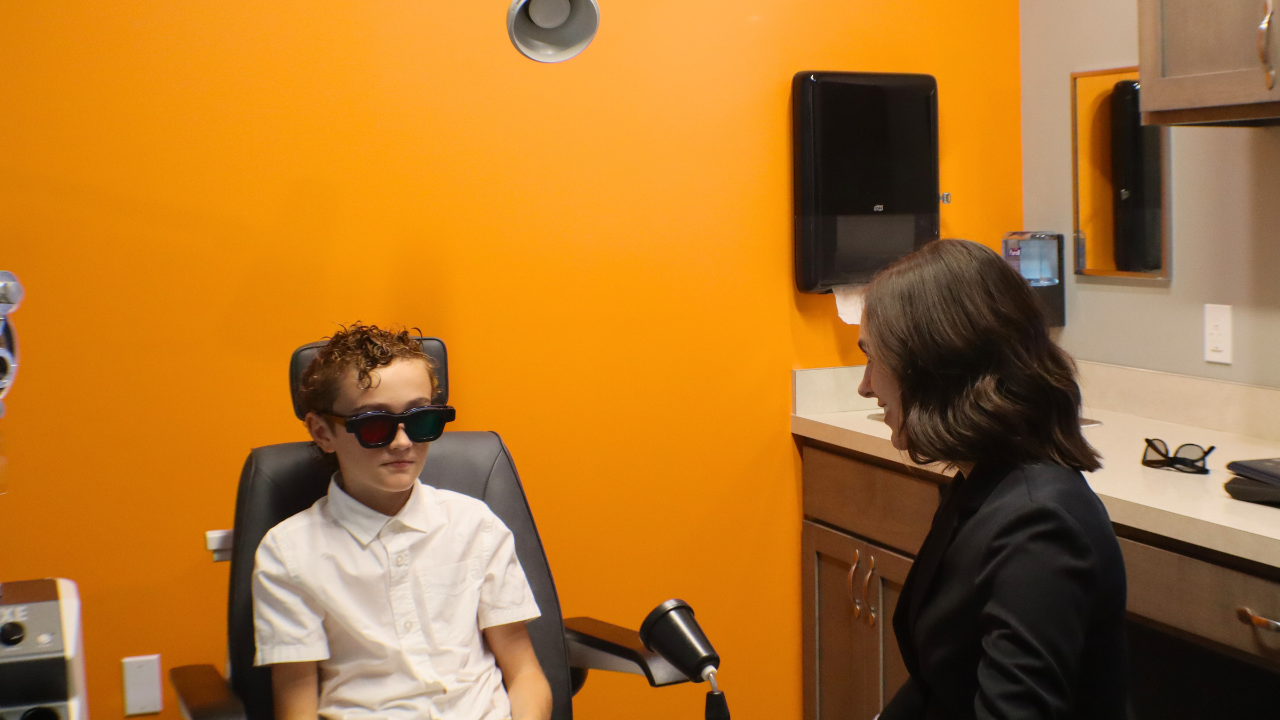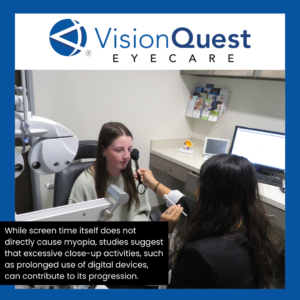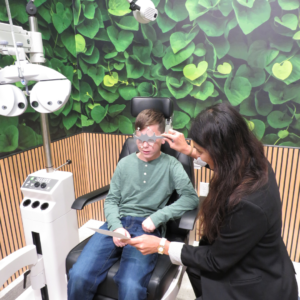As technology continues to become an integral part of daily life, children are spending more time on screens than ever before. Whether it’s for online learning, gaming, or entertainment, prolonged screen use has raised concerns about its impact on children’s eye health, particularly its potential to worsen myopia (nearsightedness).
At VisionQuest Eyecare, we often receive questions from parents about the connection between screen time and myopia progression in children. Let’s explore the facts, risks, and how you can help protect your child’s vision.
Understanding Myopia in Children
Myopia, or nearsightedness, is a common refractive error where distant objects appear blurry while close objects are seen clearly. It usually develops in childhood and often progresses until the late teens or early twenties. Myopia occurs when the eye grows too long or when the cornea is overly curved, causing light to focus in front of the retina rather than directly on it.
Is Screen Time Linked to Myopia Progression?
While screen time itself does not directly cause myopia, studies suggest that excessive close-up activities, such as prolonged use of digital devices, can contribute to its progression. Here’s why:
Prolonged Near Work: Activities that require focusing on close objects, like reading or using tablets and smartphones, can strain the eyes. Over time, extended periods of near work may encourage the elongation of the eyeball, which is a key factor in myopia development.
Reduced Outdoor Time: Research shows that spending more time outdoors, particularly in natural daylight, may slow myopia progression. Increased screen time often means less outdoor play, depriving the eyes of beneficial exposure to natural light.
Digital Eye Strain: Staring at screens for long periods can lead to digital eye strain, characterized by symptoms such as blurred vision, headaches, and dry eyes. While these symptoms don’t cause myopia, they may exacerbate discomfort and make focusing more difficult.
Posture and Viewing Distance: Poor posture and holding devices too close to the eyes can further strain the visual system, potentially affecting the progression of myopia.
Signs Your Child’s Myopia May Be Progressing
Children often don’t realize their vision is changing, so it’s crucial for parents to watch for signs that myopia may be worsening:
- Squinting to see distant objects
- Sitting closer to the TV or holding devices very close
- Complaints of headaches or eye strain
- Difficulty seeing the board in school
- Frequent changes in prescription glasses
How to Manage Screen Time and Protect Your Child’s Vision
Managing screen time effectively and incorporating healthy eye habits can help reduce the risk of worsening myopia. Here are some actionable tips:
1. Follow the 20-20-20 Rule
Encourage your child to take a 20-second break every 20 minutes to look at something 20 feet away. This practice helps relax the eyes and reduce strain.
2. Promote Outdoor Activities
Spending at least 2 hours a day outdoors can significantly benefit children’s eye health. Natural light has been shown to slow the progression of myopia and support overall well-being.
3. Limit Screen Time
Set clear boundaries on the amount of time your child spends on digital devices. The American Academy of Pediatrics recommends no more than 1-2 hours of recreational screen time per day for children.
4. Encourage Proper Viewing Habits
Teach your child to:
- Hold screens at least 18-24 inches from their eyes.
- Sit with good posture and avoid slouching.
- Use devices in well-lit rooms to minimize glare and reduce strain.
5. Schedule Regular Eye Exams
Comprehensive eye exams are crucial for monitoring myopia progression and ensuring your child’s vision remains clear and healthy. VisionQuest Eyecare provides pediatric eye exams tailored to detect and manage myopia early.
6. Consider Myopia Management Treatments
If your child’s myopia is progressing rapidly, specialized treatments can help slow its progression. These may include:
- Orthokeratology (Ortho-K): Special contact lenses worn overnight to reshape the cornea temporarily.
- Atropine Eye Drops: A low-dose medication that has been shown to slow eye growth.
- Multifocal Contact Lenses or Glasses: Designed to reduce strain and control myopia progression.
Why Early Intervention Matters
Left unmanaged, myopia can lead to high myopia, which increases the risk of serious eye conditions later in life, such as retinal detachment, glaucoma, and macular degeneration. Early intervention is key to protecting your child’s long-term vision health.
VisionQuest Eyecare: Your Partner in Myopia Management
At VisionQuest Eyecare, we are committed to helping children maintain healthy vision through expert care and personalized treatment plans. Our Greenwood and Fishers locations offer comprehensive eye exams, myopia management options, and practical advice to help your family manage screen time effectively.
If you’re concerned about your child’s screen time and its impact on their vision, schedule an appointment with us today. Together, we can ensure your child enjoys clear, comfortable vision for years to come.
Visit VisionQuest Eyecare to learn more or book your child’s eye exam online.
Don’t wait—early action makes all the difference!

Dr. Chris Browning is a Greenwood native, who has been serving the community through glaucoma care and myopia management. He studied at Indiana University Bloomington and the Indiana University School of Optometry. As he has severe nearsightedness himself, Dr. Browning is passionate about helping others to achieve excellent vision.



